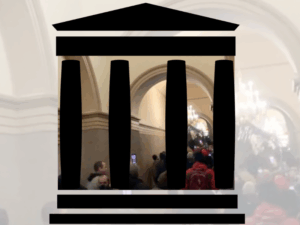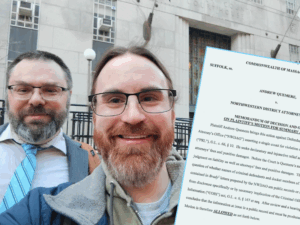Tom Koonce (left) and his son, Thomas Andrews, circa 2018, taken at MCI Norfolk
“You had one really horrible day and you paid dearly but I think you paid enough.”
On Jan. 26, 54-year-old prisoner Thomas Koonce, a former US Marine who was born in Brockton, spent nine-and-a-half hours at the Massachusetts State House offering his case for commutation to the eight-person Governor’s Council. Sitting alongside his attorney, Timothy C. Foley, Koonce, in a suit and tie, was supported by seven in-person witnesses and four virtual ones, and held his ground under some intense grilling by the councilors.
The hearing, fraught with audio problems for those watching on Webex at home, was so long that at one point after 6pm Councilor Eileen Duff said to Koonce, “Do you need anything to eat? Because [we] can get you some food.” The audio problems such as those demonstrated in a clip of Conan Harris, Boston’s former head of safety under Mayor Marty Walsh, made it difficult for people watching remotely to hear most witnesses.
This was the first of two commutation hearings sent to Mass Gov. Charlie Baker by the state’s Advisory Board of Pardons (a function of the Parole Board) on Jan. 15, 2021. Koonce, who has served nearly 30 years, waited almost a year for Baker to sign off on his petition which the governor finally set in motion on Jan. 13 of this year. William Allen, who has served 27 years and is currently incarcerated at Old Colony Correctional Center, is scheduled for the second hearing on Feb. 2.
No life sentences in Mass have been commuted from first-degree (no chance for parole), to second-degree (with parole eligibility) since 1997 when William Weld was governor. If Koonce and Allen get the go-ahead from the all-white Governor’s Council, they will then have to apply for parole. Those serving life sentences in Mass who earn parole currently serve the remainder of their sentences in the community under supervision.
The hearing was also the first held under new guidelines put in place by the Baker administration. Under those orders, consideration of a commutation petition is “an extraordinary remedy” that offers a petitioner the opportunity to prove they have done the necessary work since commission of their crime to make amends and engage in restitution and/or restorative justice practices while behind bars. Restorative justice equally encourages accepting responsibility by those who have harmed others and forgiveness for those who have committed harm.
As we reported last October when Koonce went before the Advisory Board of Pardons, he “lived a life of ‘restoration and reparations’ [after] he came to grips with killing Mark Santos in a clash between New Bedford and Brockton young adults in 1987. Koonce was one of the main people to bring restorative justice programs to Norfolk MCI, and … has been instrumental in ‘making the prison a safer place.’”
Janet Connors, a survivor of her son’s tragic homicide and a nationally-known educator and restorative justice practitioner, testified before the Council that Koonce “exemplifies goodness,” is a “stellar human being,” and “helps survivors forgive the unforgivable.”
Others who testified noted how Koonce helped their transformation while in prison. Nicholas DeJarnette, who is now a successful business owner and met Koonce behind bars more than 15 years ago, offered to pay “6 months, [even] a year” of rent for a man he called “the real deal,” and “the reason I went to Boston University.”
Koonce’s son, Thomas Andrews (pictured above), who was born a month before Koonce was convicted of life without parole, said, “People come out of the woodwork to tell me about the influence my father has had on their lives.” He also said he has become very connected to his father over the years. “He makes me want to do better every day,” Andrews said.
There was no testimony against Koonce. However, Councilor Christopher Iannella read a letter into the record from Mark Santos’s family that had been submitted to the Advisory Board of Pardons in 2021 and seemed addressed to Governor Baker (“Your Honor”), asking that Koonce stay behind bars.
In an unusual twist, current Bristol County District Attorney Thomas Quinn testified that he thought a commutation for Thomas Koonce was “a just and appropriate result.” He said, “Of particular significance is that his rehabilitative efforts were done while he believed he was going to spend the rest of his life in prison.” Quinn recognized that in terms of taking responsibility, Koonce wrote a letter of apology to Mark Santos’s family early on.
Several councilors noted how unusual it was for a DA to testify for anyone in Koonce’s position. That did not stop the councilors from questioning Quinn, asking him to speculate about elements of the trial. Iannella said that he believed Koonce was “overcharged,” insisting Koonce never should have had a first-degree murder charge.
More than four-and-a-half hours into the hearing, Koonce’s attorney Foley spoke about his client’s reaction to hearing that Gov. Baker signed off on his commutation: “Tim, it’s a great day for me, but obviously, it’s a very trying and sad day for Virginia Santos and her family.”
Koonce sent me an email in mid January explaining how, in prison, he managed to continue doing what he loves—restorative justice circles—even during the pandemic. He said he’d been allowed “to run a few small circles to help the men deal with the loss of family members; physical health; mental health; quality health care; visits; and other losses as a direct result of COVID and/or the lockdown.”
He also shared that his biggest challenge while he waited to hear if Baker would approve his commutation was losing his mother and brother within five months of each other. His brother passed away last Aug. 19; his mother passed two days after he received word that Baker approved his commutation.
After Koonce spoke at the hearing about the restorative justice work he plans to do in the community if he is granted a commutation and then a parole, he was asked to retell the story of his crime. At age 20, he’d been home from the Marine Corps on leave. There was a skirmish between two groups of kids, those from New Bedford and his group from Brockton. He fired a gun into the air, from a car, hoping to stop the oncoming crowd from more antics, and that single gunshot hit Mark Santos in the chest. This resulted in more than one trial, both prosecuted by then-Plymouth County Assistant District Attorney John Moses. Years later, Moses testified at an earlier unsuccessful commutation hearing that he believed Koonce was overcharged and never should have been tried for first-degree-murder.
While several councilors noted that Koonce was tried by an all-white jury, not much else was said about the role that racism often plays in the arresting and convicting of young Black men. A 2021 study by the Sentencing Project found that more than two-thirds of those serving life sentences are people of color. In Massachusetts, researchers found those sentenced to life are: “34% Black; 41% white; 20% Latinx.”
Baker’s guidelines specify that the seriousness of the crime—in this case, murder—should be considered when deciding on a commutation, but considering the petition does not mean a rehash of the trial. Still, Koonce was interrogated, and specifically asked why he carried a gun.
Many studies and articles have been written about why young Black men carry guns. According to the Philadelphia Enquirer, which interviewed activists, academics, and more than two-dozen men impacted by gun violence, “Guns are an everyday fact of life in many areas, with the reasons young men carry them including showing off, personal protection, and retaliation.”
For more than an hour, Councilor Robert Jubinville disputed Koonce’s retelling of events regarding how he shot Mark Santos. Councilor Eileen Duff felt he “beat up” on Koonce but also was unsure about how the gunshot happened. Councilor Terrence Kennedy concurred, but added, addressing the petitioner, “I don’t think that is why we’re here. You had one really horrible day and you paid dearly but I think you paid enough.” He signaled that Koonce should sleep well, knowing he has the votes for commutation.
The day after the hearing, on his Facebook page, Councilor Paul DePalo wrote, “Commutations, and the example of Mr. Koonce, provide hope and incentive for incarcerated individuals to pursue restorative justice, self-improvement, education, and job training.”
The councilors will vote on Koonce’s petition on Feb. 16.
This article is syndicated by the MassWire news service of the Boston Institute for Nonprofit Journalism. If you want to see more reporting like this, make a contribution at givetobinj.org.








